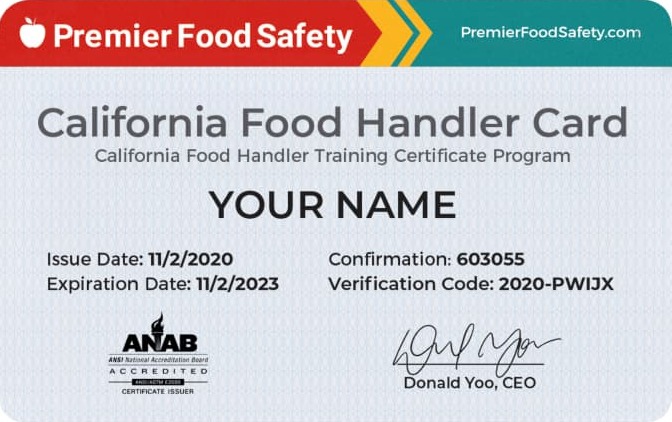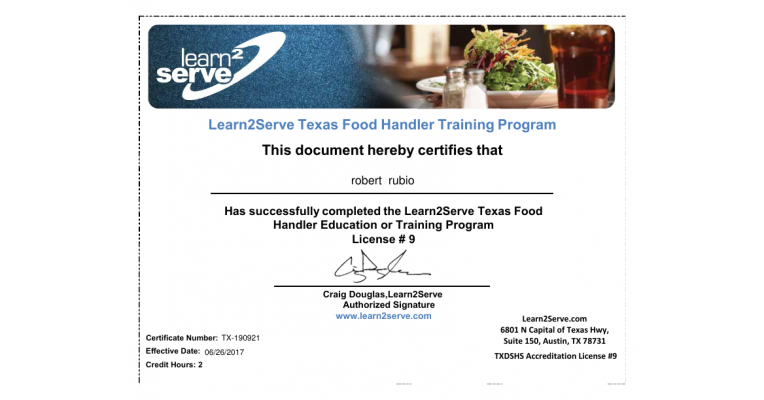Exactly How the ServSafe Food Handler Certification Prepares You for a Job in Friendliness
Exactly How the ServSafe Food Handler Certification Prepares You for a Job in Friendliness
Blog Article
Obtain Certified: Master Food Security With Food Handler Qualification
The value of acquiring a Food Handler Certification can not be overemphasized in today's food service landscape. This credential not only equips individuals with important expertise of health and security methods but also plays a pivotal duty in guarding public health. As the industry encounters enhancing scrutiny pertaining to food safety criteria, comprehending the qualification process and its effects ends up being crucial. Yet, lots of might continue to be unaware of the comprehensive benefits that extend past compliance. What opportunities could occur for those who take this vital step towards mastery in food safety and security?

Value of Food Safety Certification
Food security qualification is critical for making certain that food handlers are furnished with the expertise and skills required to maintain high standards of hygiene and security in food prep work and service. This accreditation not just enhances the competency of individuals functioning in the food industry but additionally cultivates a culture of safety and security that benefits both customers and staff members.
By getting food security accreditation, food trainers become knowledgeable about important techniques such as correct food storage space, cross-contamination prevention, and personal hygiene requirements. ServSafe Food Handler. This understanding substantially lowers the danger of foodborne ailments, which can have severe health ramifications and influence public count on in food facilities. In addition, licensed food trainers are better prepared to abide with national and local policies, thus minimizing the threat of lawful responsibilities and charges for food companies.
Additionally, having certified personnel can boost an establishment's reputation, as consumers increasingly focus on safety and security in their eating experiences. Ultimately, food security certification is not simply a regulatory demand; it is a crucial financial investment in the overall quality and reliability of food solution operations, fostering trust and ensuring that safety and security continues to be a leading concern in the market.

Summary of Qualification Process
Protecting food safety and security accreditation involves an organized process made to furnish food handlers with the necessary knowledge and abilities. This process generally starts with selecting an approved training program, which can be delivered in various formats such as in-person classes, online training courses, or crossbreed options. Individuals need to pick a program that meets local regulatory requirements and aligns with their understanding preferences.
Once enlisted, prospects involve in extensive training that covers necessary food safety principles and methods - ServSafe Food Handler Certification. This training often consists of interactive components, real-world scenarios, and assessments to reinforce learning. After completing the coursework, individuals should pass an accreditation examination that examines their understanding of food security concepts
Upon effectively removing the exam, individuals get their food trainer certification, which is generally legitimate for a details duration, often ranging from one to 3 years. It is essential for certified food trainers to remain updated with any changes in food safety and security guidelines and techniques, requiring routine revival or continuing education and learning. This qualification procedure is essential for guaranteeing that food trainers are well-informed about risk-free food handling methods, consequently minimizing the danger of foodborne illnesses and promoting public health and wellness.
Key Topics Covered in Training
An extensive food handler training program typically covers several vital topics important for preserving food security and protecting against foodborne health problems. Recognizing the principles of food safety is foundational, including the value of correct hygiene methods for food handlers. This includes handwashing techniques, appropriate use gloves, and individual sanitation requirements.
An additional vital area is the recognition and monitoring of food threats. Students find out about biological, chemical, and physical hazards, together with methods for preventing cross-contamination. Temperature control is also emphasized, as keeping correct food preparation and storage temperature levels is vital for preventing microbial growth.
The training program addresses secure food storage techniques, describing exactly how to appropriately identify and arrange food things to guarantee freshness and security. Additionally, participants are enlightened on cleansing and disinfecting treatments for equipment and surfaces to get rid of possible contaminants.

Benefits of Obtaining Qualified
Getting food handler qualification provides various benefits that expand beyond individual expertise and abilities. Firstly, it improves an individual's understanding of risk-free food methods, which is vital in stopping foodborne illnesses. This expertise not only safeguards the health and wellness of customers but also advertises a culture of food ServSafe Food Handler safety within the office.
In addition, qualification demonstrates a dedication to professionalism and responsibility. Employers usually choose or call for certified employees, recognizing that certified individuals are most likely to abide by security procedures and policies. This can bring about improved office performance and reduced responsibility for services, as skilled team are better furnished to manage food securely.
Additionally, acquiring qualification can he has a good point enhance an individual's self-confidence in their role within the food solution market. This confidence can equate into much better customer care and complete satisfaction, as workers who recognize food security are most likely to connect successfully concerning food preparation and handling.
Lastly, several certification programs offer upgraded training and resources, making certain that qualified individuals remain notified about the most up to date guidelines and best methods, therefore reinforcing their function as well-informed professionals in the food security landscape.
Profession Opportunities in Food Security
The foundation of food safety knowledge got via accreditation opens up a variety of career opportunities within the food industry. As food safety and security guidelines become significantly strict, organizations seek certified experts to guarantee compliance and keep high requirements.
People with food handler qualification can seek functions such as food security inspectors, that analyze facilities for adherence to health laws, or food security managers, entrusted with developing and executing safety and security methods in food handling plants or dining establishments. Furthermore, roles in high quality guarantee and control are offered, where professionals check production procedures to reduce dangers related to view foodborne diseases.
In addition, the expanding trend of food sustainability and organic products has created chances for food security experts that concentrate on recommending firms on ideal techniques. Those with a qualification can additionally discover settings in education and learning and training, assisting to educate others concerning risk-free food dealing with practices.

Final Thought
Food handler qualification serves as a crucial element in improving food safety within the food solution industry. As food safety proceeds to be a concern, the qualification opens doors to many career possibilities in this important field.
By obtaining food safety and security qualification, food handlers end up being acquainted with important methods such as proper food storage, cross-contamination prevention, and individual hygiene criteria.Protecting food safety and security accreditation entails a structured procedure developed to outfit food handlers with the required knowledge and abilities. It is important for qualified food trainers to remain upgraded with any kind of changes in food safety policies and methods, demanding periodic renewal or proceeding education and learning.A detailed food trainer training program usually covers numerous vital topics crucial for keeping food safety and stopping foodborne illnesses.Food trainer accreditation serves as an important component in boosting food safety within the food solution sector.
Report this page